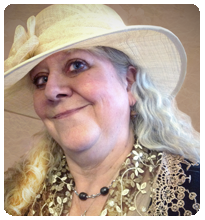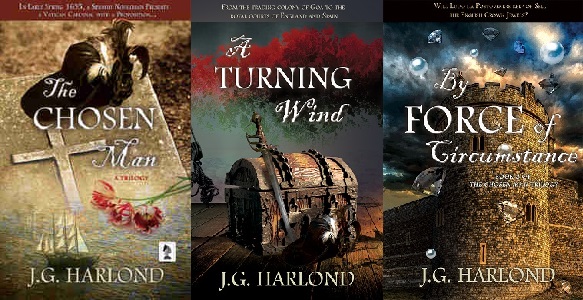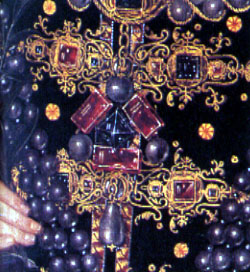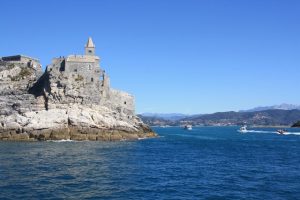Blending Facts Into Fiction
by Helen Hollick
My Sea Witch Voyages are nautical adventure yarns set in the Golden Age of piracy, the early 1700s. As with many a typical sailor’s yarn, part of the tales are solid sailing facts, others can be distinctly fanciful. That blend of fiction – even fantasy – is made believable by the inclusion of facts. Get the facts right, then a reader will believe the fictional bits.
 I use several real historical figures as additional characters alongside my scallywag protagonist, Captain Jesamiah Acorne, because the history is important as a background to his various sea-going adventures.
I use several real historical figures as additional characters alongside my scallywag protagonist, Captain Jesamiah Acorne, because the history is important as a background to his various sea-going adventures.
In the latest Voyage, Gallows Wake, Jesamiah meets up with Edward Vernon, who was a real, respected Admiral. But in my story, set in 1719, Vernon is still a relatively unknown Captain. Jesamiah has had a run-in with him in the past (in the second Voyage, Pirate Code) and here they are, to meet again.

I’ve invented this part of Vernon’s career, of course, but in factual history, Vernon had a long and highly distinguished career, after forty-six years of service, becoming an admiral. Born in November 1684, he died in October 1757, making him thirty-five at the time when Gallows Wake is set.
In 1739 Vernon was responsible for the capture of Porto Bello, during the War of Jenkins’ Ear. He served as a Member of Parliament on three occasions, and had a reputation of being particularly outspoken on naval matters, making him a somewhat controversial figure.
I expect you have heard the slang term ‘Grog’ for rum which has been diluted with water? ‘Grog’ is attributed to Vernon, whose nickname was ‘Old Grog’. He was well known for wearing coats made of grogram material. Originally, this was Grosgrain a corruption of the French word. Gros gram is a coarse, loosely woven fabric of silk, silk and mohair, or silk and wool. Gros means thick or coarse, while grain is from Old French graine from either seed or texture. Vernon introduced watered rum into his naval squadron, which the sailors soon began to call ‘Grog’.
Vernon is also the eponym of George Washington’s estate Mount Vernon, and the many places in the United States which are named after it. George Washington’s older half-brother served on Vernon’s flagship HMS Princess Caroline in 1741. In honour of his former commander, he named his Virginia estate Mount Vernon.
I have slightly altered some of the dates and places in order to put Vernon where I wanted him in the summer and autumn of 1719 – Gibraltar and Spain, (he was possibly in the Baltic, in fact) so the events that happen in Gallows Wake are entirely fictitious, but the man himself is not.
It was quite fun giving him an adventure with my Jesamiah Acorne.
Read an excerpt from Gallows Wake
“Captain?”
Edward Vernon looked up from the letter he was writing, annoyed at being disturbed in the sanctity of his Great Cabin, but half expecting it. They were not long under way and there was always uncertainty during the first hours of making sail. Especially where his dithering second lieutenant was concerned. A young man of nineteen years old, he had the prospect of a good future ahead of him were he only to apply himself, but Lieutenant Lancelot Lande well-earned his nickname of ‘Three Ells’, for his name, his general uncertainty and over-used, ‘Look Lively Lads’ the latter two of which the bosun, Almitty, seized upon to make use of his cane. Not that Vernon disapproved of genuine discipline – far from it – but unnecessary brutality soured the men, and there was a loyal, hard-working crew aboard Bonne Chance. Despite the sadistic nature of ‘Gawd Almighty’, Mr Almitty.
Lande entered, did not stoop low enough beneath the overhead beams and knocked his hat off. He blushed, retrieved it and stood smartly before Vernon’s desk, which even after this short time at sea was already littered with cluttered paraphernalia.
“My apologies for interrupting your solitude, Captain. Writing to your lady wife, are you? I will do so to my dear mama, if ever I find the time. Not that she appreciates letters pertaining to a nautical bent, but…”
“Yes, Mr Lande, I pen a paragraph or two for Mrs Vernon at the close of every day. How may I help you?”
Mr Lande twirled his hat between his stubby fingers. “Well, ’tis a tad unorthodox, but there’s a chap aboard, a passenger bound for Cádiz. He is something to do with the children we have aboard.”
Vernon focused on the hat. How many times had he told Lande not to wear the thing below deck – for the reason shown. Low ceiling beams and the height of men were incompatible. Hats got knocked off, and looked comical in the eyes of the crew and undignified for the officers. Ignoring the hat issue, he said, “The children, and their escort, are of no consequence to me Mr Lande. I have made it quite clear that they are to remain below and out of our way. Fortunately, it is but a short voyage to our destination. I estimate, twelve, sixteen hours at most if wind and weather suit?”
“Aye, indeed, sir.”
“So, what is the problem? Everything is in order, is it not? Where is Mr Coffney?” Vernon faked a smile, despite his irritation.
“First Lieutenant Coffney is busy, sir, with an incident concerning one of the men.”
An incident? Something I should be informed of? Vernon wondered, then dismissed the thought. Unlike Lande, Coffney was a capable officer, and obviously the matter was of no large consequence, else he would have been informed of it.
“I am more than content to leave our passage and those children in the capable hands of yourself and Lieutenant Coffney.” Vernon indicated his letter. “So, I would very much like to finish this paragraph and then seek my cot. It is, after all,” he extracted a pocket watch from his waistcoat, flipped its gold protective case open and studied the hour. “It is approaching a quarter less eleven of the clock. Should these children not be snuggled in their blankets, and asleep?”
Lande did not return the smile. “I think they are, sir. I apologise for the interruption, but it is not about the children. Least, I do not think it is. Mayhap it will wait until morning? Although he was most insistent.”
“He?”
“Our passenger.”
“Is it, then, important?”
“The gentleman said it was.”
Give me strength, Vernon thought; said with patience, “Who is this gentleman? What does he want?”
“What he wants I do not know, sir, but he said he requires to speak in private with you as a matter of urgency. He made the request to Lieutenant Coffney as soon as he came aboard, before we sailed.”
“And you have only now brought the matter to my attention?”
“Aye, sir. We were busy getting under way and Mr Coffney did not wish to disturb you.”
“But you feel I may be disturbed now?”
“The gentleman has been most persistent. He says it is government business.”
Vernon pursed his lips. So, this was the government representative for these blasted children? As a captain, Vernon considered that he was perfectly capable of delivering them to their devoted parents without some fop of a government attaché interfering. He sighed. Could there be more to this mission than he perceived?
“I had better see him. Please show him in, Mr Lande.”
Lande gestured a salute, made to replace his hat, thought better of it and tucked the thing beneath his arm. “Very good, sir.”
Vernon returned to his letter, heard someone enter, did not look up but continued writing.
A soft cough.
He finished the sentence, placed the quill pen in the inkpot, dusted the letter with sand, then sat back in his chair, folding his hands over his stomach. Looked at a cleanshaven, well-dressed man of about his own height of four inches under the six foot, but a little stouter of build. Hat tucked beneath his arm, he made a slight, respectful bow. Vernon noticed that his hands were work-worn and bore a slight trace of tar beneath the nails. No rough sailor, but a man who knew work when required?
“Good evening to you, sir,” Vernon said, congenially, but with a little curiosity to his tone. “How may I be of assistance?”
THE VOYAGES:
SEA WITCH Voyage one
PIRATE CODE Voyage two
BRING IT CLOSE Voyage three
RIPPLES IN THE SAND Voyage four
ON THE ACCOUNT Voyage five
WHEN THE MERMAID SINGS – a prequel to the series (short-read novella)
And just published… GALLOWS WAKE
The Sixth Voyage of Captain Jesamiah Acorne
by Helen Hollick
Where the Past haunts the future…
Damage to her mast means Sea Witch has to be repaired, but the nearest shipyard is at Gibraltar. Unfortunately for Captain Jesamiah Acorne, several men he does not want to meet are also there, among them, Captain Edward Vernon of the Royal Navy, who would rather see Jesamiah hang.
Then there is the spy, Richie Tearle, and manipulative Ascham Doone who has dubious plans of his own. Plans that involve Jesamiah, who, beyond unravelling the puzzle of a dead person who may not be dead, has a priority concern regarding the wellbeing of his pregnant wife, the white witch, Tiola.
Forced to sail to England without Jesamiah, Tiola must keep herself and others close to her safe, but memories of the past, and the shadow of the gallows haunt her. Dreams disturb her, like a discordant lament at a wake.
But is this the past calling, or the future?
From the first review of Gallows Wake:
“Hollick’s writing is crisp and clear, and her ear for dialogue and ability to reveal character in a few brief sentences is enviable. While several of the characters in Gallows Wake have returned from previous books, I felt no need to have read those books to understand them. The paranormal side of the story—Tiola is a white witch, with powers of precognition and more, and one of the characters is not quite human—blends with the story beautifully, handled so matter-of-factly. This is simply Jesamiah’s reality, and he accepts it, as does the reader.”
Author Marian L. Thorpe.
BUY LINKS:
Amazon Author Page (Universal link): https://viewauthor.at/HelenHollick
Where you will find the entire series waiting at anchor in your nearest Amazon harbour – do come aboard and share Jesamiah’s derring-do nautical adventures! Available Kindle, Kindle Unlimited and in paperback. Or order a copy from your local bookstore!
 ABOUT HELEN HOLLICK
ABOUT HELEN HOLLICK
First accepted for traditional publication in 1993, Helen became a USA Today Bestseller with her historical novel, The Forever Queen (titled A Hollow Crown in the UK) with the sequel, Harold the King (US: I Am The Chosen King) being novels that explore the events that led to the Battle of Hastings in 1066. Her Pendragon’s Banner Trilogy is a fifth-century version of the Arthurian legend, and she writes a nautical adventure/fantasy series, The Sea Witch Voyages.
Helen is now also branching out into the quick read novella, ‘Cosy Mystery’ genre with her Jan Christopher Murder Mysteries, set in the 1970s, with the first in the series, A Mirror Murder incorporating her often hilarious memories of working as a library assistant.
Her non-fiction books are Pirates: Truth and Tales and Life of A Smuggler. She lives with her family in an eighteenth-century farmhouse in North Devon and occasionally gets time to write…
Website: www.helenhollick.net
Newsletter Subscription: http://tinyletter.com/HelenHollick
Blog: www.ofhistoryandkings.blogspot.com
Facebook: www.facebook.com/HelenHollick
Twitter: @HelenHollick https://twitter.com/HelenHollick


 The first Ludo story was inspired by a combination of two events; one very real with devastating financial consequences, the other un-real, other-worldly, when I ‘saw’ people during a visit to Cotehele in Cornwall (while preparing for another book altogether). Cotehele, a National Trust property on the River Tamar, became the fictional house Crimphele, then the story-line fell into place as I watched news coverage of the Lehman Brothers and mortgage scandals in the USA. I had lived in the Netherlands, was acquainted with the tulip bubble, and it seemed quite plausible that a character such as Ludo (the infamous ancestor of Leo Kazan in The Empress Emerald) might be employed as an agent provocateur acting for Habsburg Spain and, supposedly, for Rome. After fitting these elements together, I then had to learn some hard facts behind ‘tulip mania’ and some of the vaguer, barely credible history behind Vatican espionage and secret agents. It took a good two years to write The Chosen Man, fortunately reviews show it was all worthwhile.
The first Ludo story was inspired by a combination of two events; one very real with devastating financial consequences, the other un-real, other-worldly, when I ‘saw’ people during a visit to Cotehele in Cornwall (while preparing for another book altogether). Cotehele, a National Trust property on the River Tamar, became the fictional house Crimphele, then the story-line fell into place as I watched news coverage of the Lehman Brothers and mortgage scandals in the USA. I had lived in the Netherlands, was acquainted with the tulip bubble, and it seemed quite plausible that a character such as Ludo (the infamous ancestor of Leo Kazan in The Empress Emerald) might be employed as an agent provocateur acting for Habsburg Spain and, supposedly, for Rome. After fitting these elements together, I then had to learn some hard facts behind ‘tulip mania’ and some of the vaguer, barely credible history behind Vatican espionage and secret agents. It took a good two years to write The Chosen Man, fortunately reviews show it was all worthwhile. A long, long time ago I had a gap year job in a jewellery and antique shop, it wasn’t what I wanted to do for the rest of my life, but I learnt a lot and it helped greatly while preparing notes for A Turning Wind. During my research, I came across the writing of the French merchant-explorer Jean-Baptiste Tavernier (1605-1689). In a spell-binding account of how diamonds were mined in the Golconda region of India, Tavernier quotes an account supposedly written by Marco Polo of how diamonds were found and traded in the area centuries before. It was too good not to use so I wove it into the opening scene. That, and the ancient ethical origins of the game Snakes and Ladders, created the background for Ludo’s second adventure, via documented history on Portugal and the ambitious Duchess of Braganza, and a little known, unrealized treaty between Charles 1st and Felipe IV of Spain. Having spent many years living near El Escorial, the scenes set there with the infamous Conde-Duque de Olivares and Velazquez were easy to write.
A long, long time ago I had a gap year job in a jewellery and antique shop, it wasn’t what I wanted to do for the rest of my life, but I learnt a lot and it helped greatly while preparing notes for A Turning Wind. During my research, I came across the writing of the French merchant-explorer Jean-Baptiste Tavernier (1605-1689). In a spell-binding account of how diamonds were mined in the Golconda region of India, Tavernier quotes an account supposedly written by Marco Polo of how diamonds were found and traded in the area centuries before. It was too good not to use so I wove it into the opening scene. That, and the ancient ethical origins of the game Snakes and Ladders, created the background for Ludo’s second adventure, via documented history on Portugal and the ambitious Duchess of Braganza, and a little known, unrealized treaty between Charles 1st and Felipe IV of Spain. Having spent many years living near El Escorial, the scenes set there with the infamous Conde-Duque de Olivares and Velazquez were easy to write. One of my aims while writing this trilogy was to show how decisions made in high places can have appalling consequences for ordinary members of society. This story in particular shows how one’s personal destiny can be determined by events far beyond one’s control. The over-riding circumstance here is a civil war. What happens to Ludo, Alina and Marcos is determined by a conflict not of their making in a country not their own and their efforts to safeguard their families. Regrettably, it is something many readers can relate to nowadays.
One of my aims while writing this trilogy was to show how decisions made in high places can have appalling consequences for ordinary members of society. This story in particular shows how one’s personal destiny can be determined by events far beyond one’s control. The over-riding circumstance here is a civil war. What happens to Ludo, Alina and Marcos is determined by a conflict not of their making in a country not their own and their efforts to safeguard their families. Regrettably, it is something many readers can relate to nowadays. This final story takes Ludo back to Portovenere in Liguria, Italy – a place I have visited many times. The name derives from a temple dedicated to the goddess Venus; and there’s a Doria castle there too. Agustin, the Doria Doge of Genoa of the epoch, had a daughter, she is un-named in the Doria family tree but she may have lived there. Barbary corsairs constantly raided the Ligurian coast – so again, what if . . .?
This final story takes Ludo back to Portovenere in Liguria, Italy – a place I have visited many times. The name derives from a temple dedicated to the goddess Venus; and there’s a Doria castle there too. Agustin, the Doria Doge of Genoa of the epoch, had a daughter, she is un-named in the Doria family tree but she may have lived there. Barbary corsairs constantly raided the Ligurian coast – so again, what if . . .?